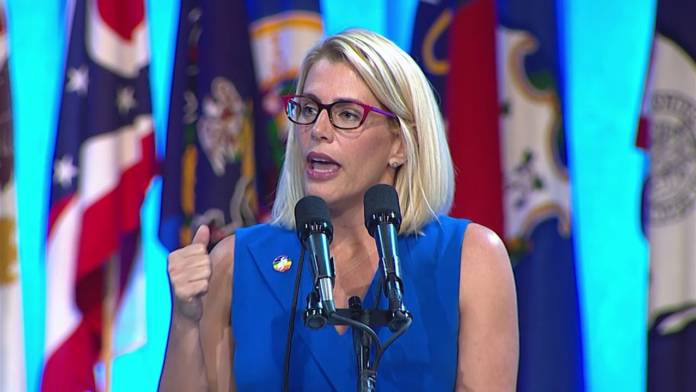When Sara Nelson, the president of the Association of Flight Attendants, talked about the protestors in Hong Kong and police violence, she got choked up.
“Our sisters and brothers in Hong Kong are standing up up to a repressive regime,” she said. “We need to stand with workers in Hong Kong as much as here.”
Nelson, one of the most powerful people in labor and widely credited with spurring the end a five-week government shutdown, was the keynote speaker at this year’s San Francisco Labor Council pre-labor day breakfast.
Nelson got national attention when she was accepting an AFL-CIO MLK Drum Major for Justice Award on January 20, 2019, and she called for a national strike. Nelson urged the dramatic move to support the 800,000 federal workers who were locked and or being forced to work without pay during the shutdown. . The next day, a handful of air traffic controllers on the East Coast didn’t show up to work, grounding flights in New York. Hours later, Trump announced a deal to reopen the government.
“Using power builds power, and once we get a taste won’t settle,” Nelson said. “Only because of unions did we hear the stories of real people during the shutdown.”
Nelson said some members of the administration wanted federal workers to walk off their jobs and use that as an excuse to privatize sections of the federal government.
“When they showed up to work without pay, the government thanked them with an increasingly unsafe workplace,” she said. “I said ‘What the hell is the labor movement waiting for?’ The strike is our tactic.”
President Grover Cleveland signed a law making Labor Day a holiday by in 1894. Pullman workers had walked out in May of that year after George Pullman laid off hundreds of employees and cut wages for many of the remaining workers at his namesake railroad company. The strike effectively halted rail traffic in 27 states, and the federal government ordered an injunction. When Cleveland sent troops to enforce it, National Guardsmen fired into a crowd, killing as many as 30 people and wounding many others.
Nelson said the history of labor isn’t taught much in this country, and it’s important for workers to learn about the importance of fighting back and what can be gained.
“Cleveland declared the strike a crime,” she said. “We have to take look at history and see that what we’ve gotten for working people didn’t materialize out of the goodwill of corporations.”
Nelson said she learned the importance of unions when she was in her 20s and new to her job. She hadn’t gotten her paycheck and had no money in her bank account. After talks with management went nowhere, Nelson felt a hand on her shoulder, and a fellow flight attendant asked her how to spell her name. The woman handed her a check for $800 and told her to call her union. She did and got a paycheck the next day.
Along with Nelson, other speakers at the breakfast included people involved in the Kaiser contract campaign, and the Airline Workers Campaign, along with House Speaker Nancy Pelosi. All talked about the importance of solidarity and standing up for workers. Nelson ended her talk by saying that the labor movement belongs to all working people.
“If you’re done with poverty, build your union. If you want affordable housing, build your union,” she said. “If you want a great economy and to save your planet, build your union.”







